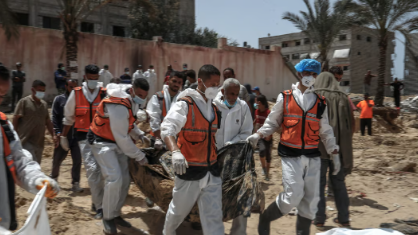Islamabad (Web Desk): A new report from the United Nations Human Rights Office (OHCHR) has highlighted the severe toll that ongoing attacks in Gaza have had on the region’s healthcare system, pushing it to the brink of collapse.
Between October 12, 2023, and June 30, 2024, there have been at least 136 airstrikes on 27 hospitals and 12 other medical facilities, causing extensive damage and loss of life. These assaults have not only killed hundreds of civilians, including medical staff, but have also severely disrupted access to critical healthcare for Palestinians, particularly in areas hit hardest by the fighting.
The destruction of hospitals has left many vulnerable populations, including pregnant women, children, and trauma victims, without essential care.
Many women have been forced to give birth under conditions that significantly increase the risk of maternal and infant death due to the lack of prenatal and postnatal services. Trauma patients, some of whom could have survived if treated in time, have died waiting for medical assistance, as the region's healthcare infrastructure has been incapacitated.
By the end of June 2024, over 500 healthcare workers were reported dead, victims of the violence that has swept through medical facilities.
Despite these severe consequences, Israel has claimed that some of the hospitals targeted were being used by Palestinian armed groups for military purposes, which could justify the attacks under international law.
However, the UN report notes that these allegations have not been sufficiently proven, and in many cases, appear to be based on vague or unverified claims.
As a result, it raises serious concerns about whether these attacks were deliberately aimed at civilian infrastructure, in violation of international law.
The report also draws attention to the broader humanitarian impact of these strikes. The use of heavy artillery and air-dropped munitions, particularly those with wide-area effects, has caused significant civilian casualties.
For example, a strike in Deir al-Balah in January 2024 killed at least 12 people and injured many others, including displaced families seeking refuge in hospitals.
In other cases, people inside hospitals were reportedly shot, though attribution for these incidents has been difficult to determine. Medical workers have also faced arbitrary detention and mistreatment, with some detained under unknown circumstances.
The UN has called for independent investigations into these incidents to ensure accountability for any violations of international law, emphasizing that the protection of medical facilities and personnel must be respected in all circumstances.
International humanitarian law protects hospitals, ambulances, and medical personnel, prohibiting attacks on them unless they are being used for military purposes.
Even in those cases, any attack must comply with principles of distinction and proportionality, ensuring that the harm caused to civilians is minimized.
As the healthcare system in Gaza continues to disintegrate, the UN stresses that Israel, as the occupying power, has a responsibility to ensure access to adequate healthcare and to prioritize the rebuilding of the health sector once the conflict subsides.
The destruction of medical infrastructure has not only caused immediate suffering but has also hindered the long-term recovery of the population, which will need medical attention long after the fighting stops.
The report concludes by reiterating the urgent need for accountability, calling for independent investigations into the destruction of hospitals and the deaths of medical personnel.
It urges the international community to hold those responsible for violations of international law accountable and to support efforts to rebuild Gaza’s healthcare system, which has been decimated over the course of the conflict.


